人教版2025八年级上册英语Unit 7 When Tomorrow Comes 单元复习课件(共48张PPT)
文档属性
| 名称 | 人教版2025八年级上册英语Unit 7 When Tomorrow Comes 单元复习课件(共48张PPT) | 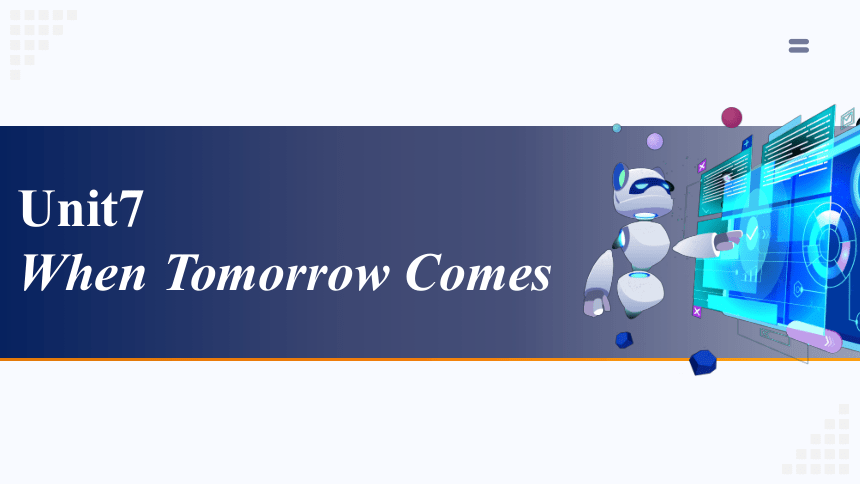 | |
| 格式 | pptx | ||
| 文件大小 | 33.1MB | ||
| 资源类型 | 教案 | ||
| 版本资源 | 人教版 | ||
| 科目 | 英语 | ||
| 更新时间 | 2025-07-16 17:15:46 | ||
图片预览

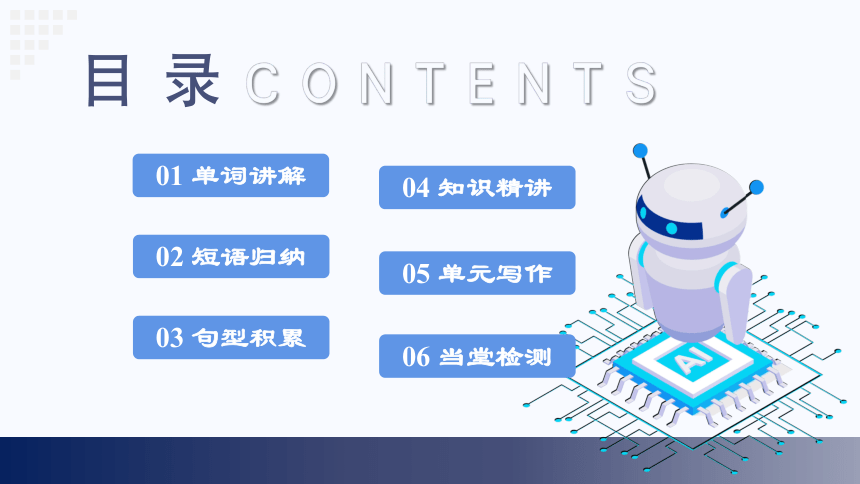
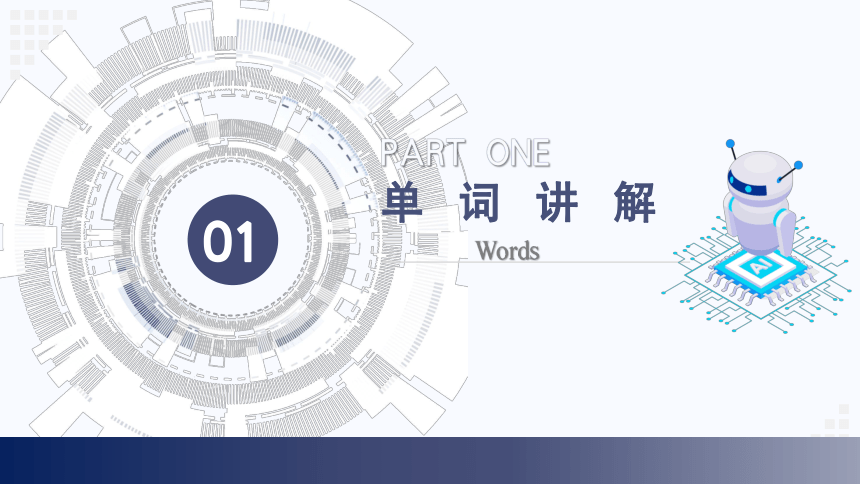
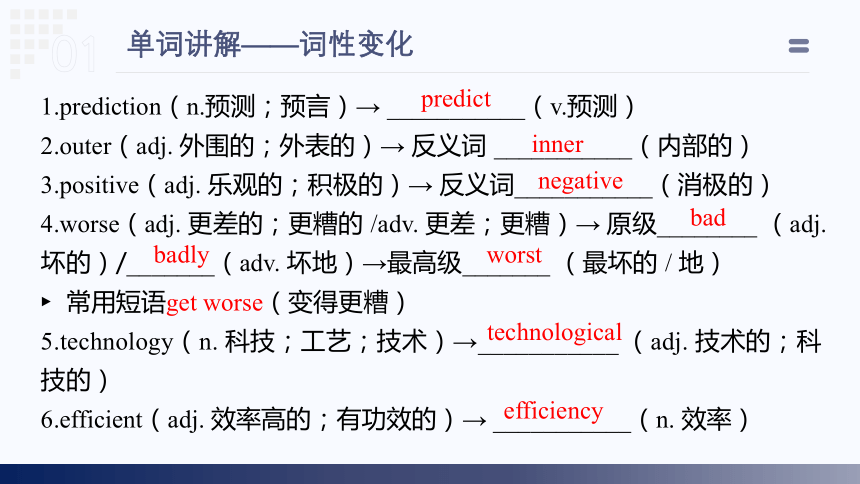
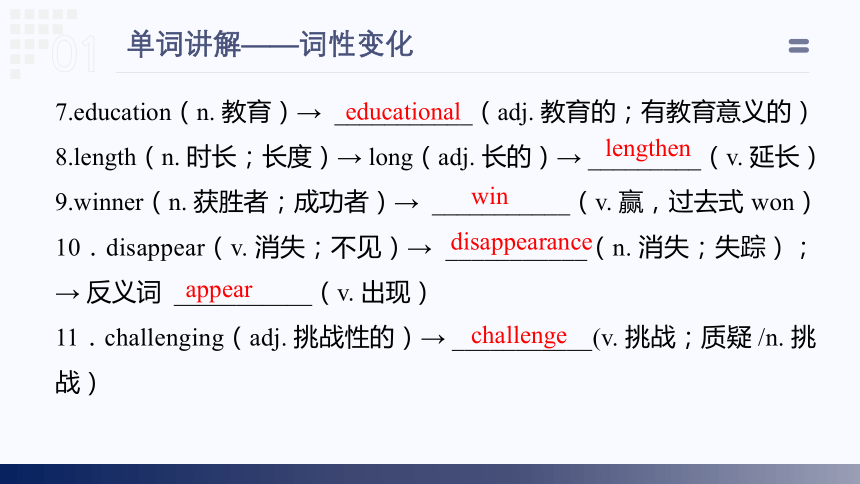
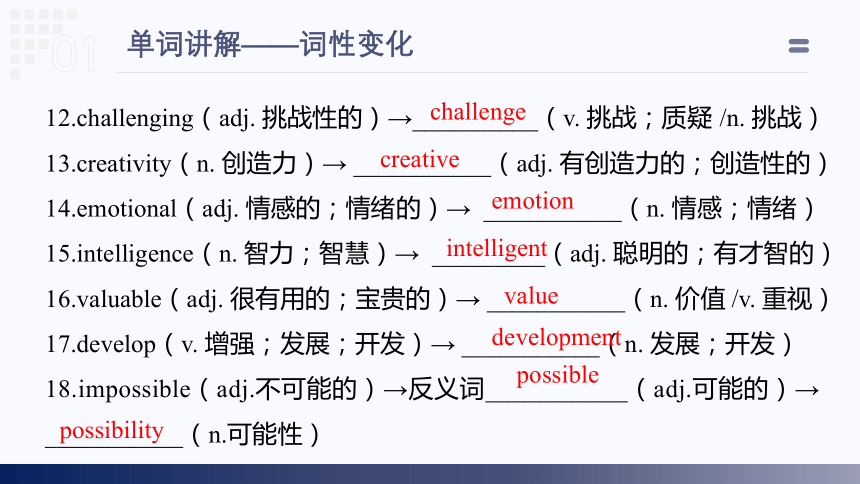
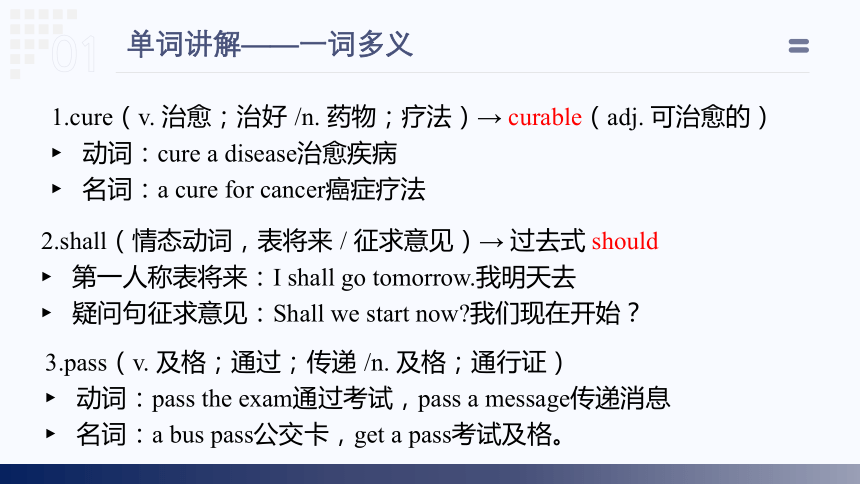
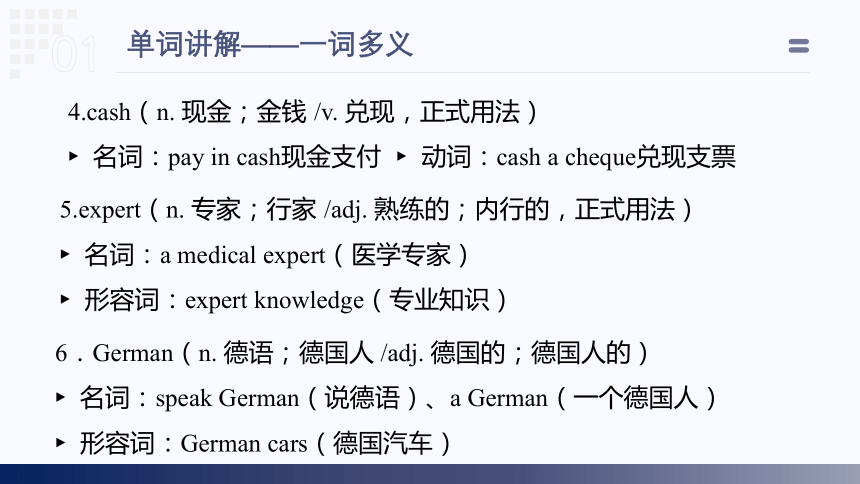
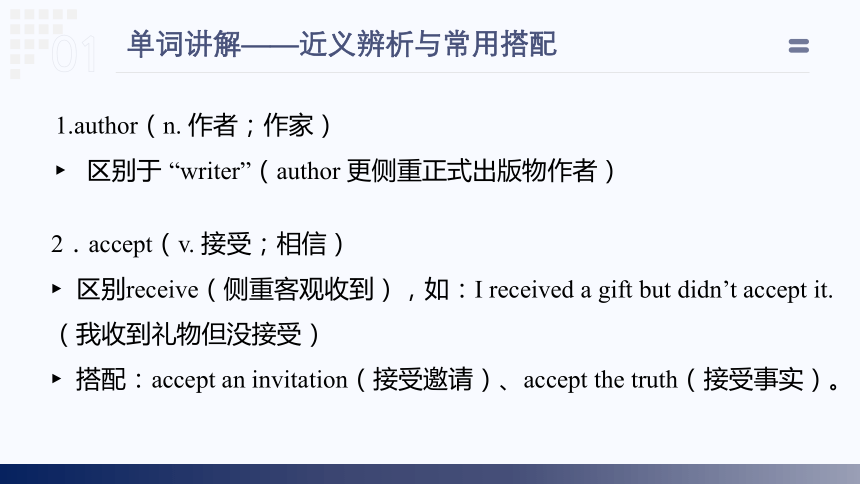
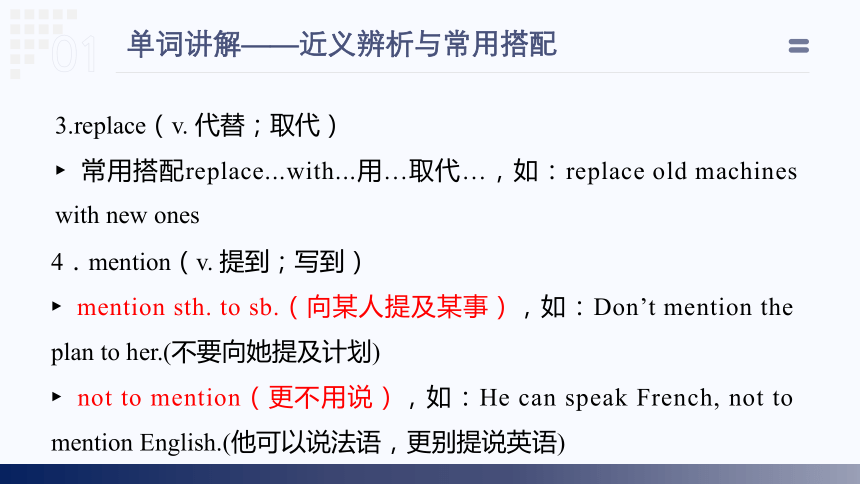
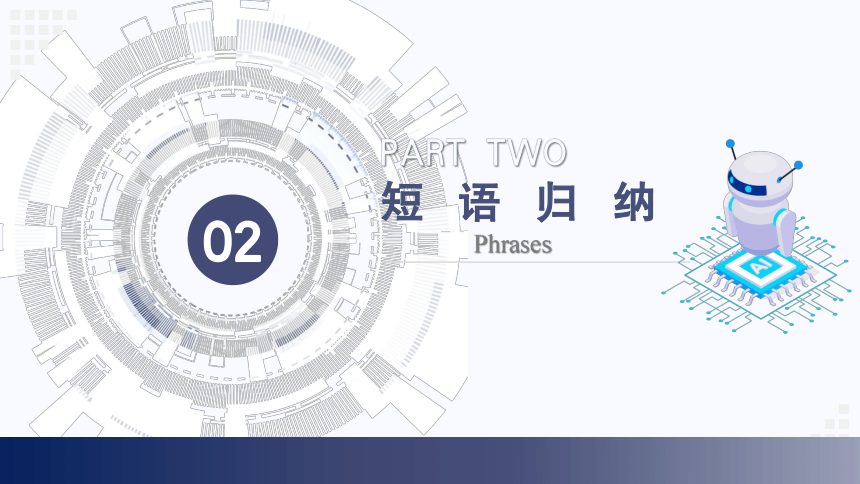
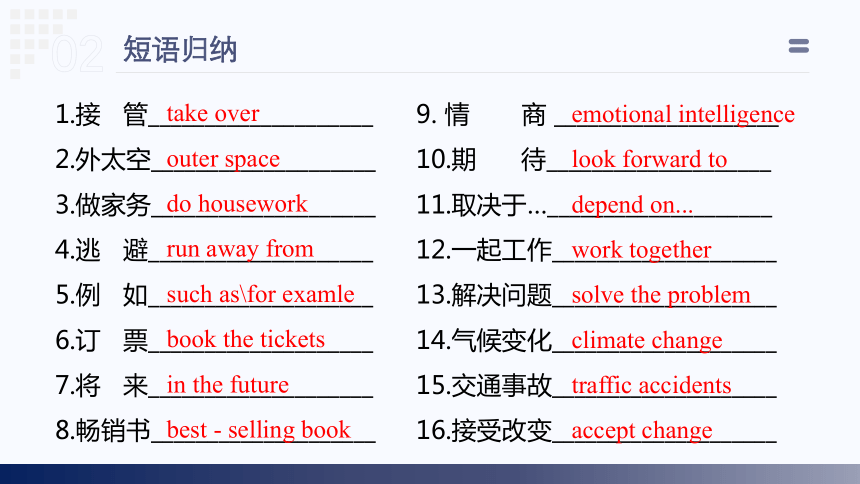
文档简介
(共48张PPT)
Unit7
When Tomorrow Comes
CONTENTS
目录
01 单词讲解
02 短语归纳
03 句型积累
04 知识精讲
05 单元写作
06 当堂检测
PART ONE
单词讲解
Words
01
单词讲解——词性变化
01
prediction(n.预测;预言)→ ___________(v.预测)
outer(adj. 外围的;外表的)→ 反义词 ___________(内部的)
positive(adj. 乐观的;积极的)→ 反义词___________(消极的)
worse(adj. 更差的;更糟的 /adv. 更差;更糟)→ 原级________ (adj. 坏的)/_______(adv. 坏地)→最高级_______ (最坏的 / 地)
常用短语get worse(变得更糟)
5.technology(n. 科技;工艺;技术)→___________ (adj. 技术的;科技的)
6.efficient(adj. 效率高的;有功效的)→ ___________(n. 效率)
predict
inner
negative
badly
bad
worst
technological
efficiency
单词讲解——词性变化
01
7.education(n. 教育)→ ___________(adj. 教育的;有教育意义的)
8.length(n. 时长;长度)→ long(adj. 长的)→ _________(v. 延长)
9.winner(n. 获胜者;成功者)→ ___________(v. 赢,过去式 won)
10.disappear(v. 消失;不见)→ ___________(n. 消失;失踪);→ 反义词 ___________(v. 出现)
11.challenging(adj. 挑战性的)→ ___________(v. 挑战;质疑 /n. 挑战)
educational
lengthen
win
appear
disappearance
challenge
单词讲解——词性变化
01
12.challenging(adj. 挑战性的)→__________(v. 挑战;质疑 /n. 挑战)
13.creativity(n. 创造力)→ ___________(adj. 有创造力的;创造性的)
14.emotional(adj. 情感的;情绪的)→ ___________(n. 情感;情绪)
15.intelligence(n. 智力;智慧)→ _________(adj. 聪明的;有才智的)
16.valuable(adj. 很有用的;宝贵的)→ ___________(n. 价值 /v. 重视)
17.develop(v. 增强;发展;开发)→ ___________(n. 发展;开发)
18.impossible(adj.不可能的)→反义词___________(adj.可能的)→ ___________(n.可能性)
challenge
creative
emotion
intelligent
value
development
possible
possibility
单词讲解——一词多义
01
3.pass(v. 及格;通过;传递 /n. 及格;通行证)
动词:pass the exam通过考试,pass a message传递消息
名词:a bus pass公交卡,get a pass考试及格。
cure(v. 治愈;治好 /n. 药物;疗法)→ curable(adj. 可治愈的)
动词:cure a disease治愈疾病
名词:a cure for cancer癌症疗法
2.shall(情态动词,表将来 / 征求意见)→ 过去式 should
第一人称表将来:I shall go tomorrow.我明天去
疑问句征求意见:Shall we start now 我们现在开始?
单词讲解——一词多义
01
4.cash(n. 现金;金钱 /v. 兑现,正式用法)
名词:pay in cash现金支付 动词:cash a cheque兑现支票
5.expert(n. 专家;行家 /adj. 熟练的;内行的,正式用法)
名词:a medical expert(医学专家)
形容词:expert knowledge(专业知识)
6.German(n. 德语;德国人 /adj. 德国的;德国人的)
名词:speak German(说德语)、a German(一个德国人)
形容词:German cars(德国汽车)
单词讲解——近义辨析与常用搭配
01
2.accept(v. 接受;相信)
区别receive(侧重客观收到),如:I received a gift but didn’t accept it.(我收到礼物但没接受)
搭配:accept an invitation(接受邀请)、accept the truth(接受事实)。
1.author(n. 作者;作家)
区别于 “writer”(author 更侧重正式出版物作者)
单词讲解——近义辨析与常用搭配
01
4.mention(v. 提到;写到)
mention sth. to sb.(向某人提及某事),如:Don’t mention the plan to her.(不要向她提及计划)
not to mention(更不用说),如:He can speak French, not to mention English.(他可以说法语,更别提说英语)
3.replace(v. 代替;取代)
常用搭配replace...with...用…取代…,如:replace old machines with new ones
PART TWO
短语归纳
Phrases
02
短语归纳
02
接 管____________________
外太空____________________
做家务____________________
逃 避____________________
例 如____________________
订 票____________________
将 来____________________
畅销书____________________
take over
outer space
do housework
run away from
such as\for examle
book the tickets
in the future
best - selling book
9. 情 商 ____________________
10.期 待____________________
11.取决于…____________________
12.一起工作____________________
13.解决问题____________________
14.气候变化____________________
15.交通事故____________________
16.接受改变____________________
emotional intelligence
look forward to
depend on...
work together
solve the problem
climate change
traffic accidents
accept change
短语归纳
02
医疗保健 ____________________
一起玩乐 ____________________
持续学习 ____________________
顺便拜访 ____________________
发行 上映____________________
关注 聚焦____________________
用完 没有____________________
多达 直到____________________
智能冰箱 ____________________
贴近;靠近____________________
举一些例子____________________
在很多方面____________________
在未来几年____________________
坚持做某事____________________
能够做某事____________________
为… 做准备____________________
health care
have fun together
keep learning
drop in
coming out
focus on
be out of
up to
smart refrigerators
stay close to
give some examples
in many ways
in the coming years
keep on doing sth
be able to
prepare for...
短语归纳
02
在地球上生活____________________
医疗卫生服务____________________
对… 做出预测____________________
服务型机器人____________________
人工智能专家____________________
癌症治愈方法____________________
满足公众需求____________________
让生活更好或更糟
____________________
41.对… 持有积极态度
____________________
42.找到出路;解决问题
____________________
live on earth
medical and health service
make predictions about
service robots
AI experts
a cure for cancer
meet the public’s needs
make life better or worse
be positive about
find your way
PART THREE
句型积累
Sentences
03
句型积累——what’s up
03
What’s up
②询问状况:当察觉对方神色、状态异样,或感觉有事儿发生,用来打听情况
You look worried. What’s up 你看起来忧心忡忡,咋 /出啥事儿啦
①日常寒暄:和熟人、朋友、同事等碰面时,作为开启对话的轻松问候,替代 “How are you ” 这类稍正式些的表达,更随性自然.
What’s up, Lisa Long time no see.莉萨,咋啦?好久不见
3、will的一般疑问句
Will people live in outer space 人们会住在外太空吗?
答句:Yes, they______ . / No, they ______
4、will的特殊疑问句
How ______ ______people live 人们会活多久?
句型积累——询问未来预测
03
1、What will the future______ ______ 未来会是什么样子?
2回答:there be 句型的将来时
There will be______ people in cities.城市里将会有更多人。
There will be ______ traffic accidents.交通事故将会更少。
be like
more
fewer
will
won’t.
long will
句型积累——难点翻译句子
03
1. 宾语从句类
1、Peter is quite positive about the future, but Teng Fei thinks most people won’t live in outer space.
2、Our creativity and emotional intelligence are important for relationships. AI will not replace humans for these things.
翻译:彼得对未来很乐观,但滕飞认为大多数人不会住在外太空。
难点:be positive about(对… 乐观 );that 引导宾语从句(可省略 )。
翻译:我们的创造力和情商对人际关系很重要,AI 不会在这些方面取代人类。
难点:replace sb. for sth.(在某方面取代某人 )。
句型积累——难点翻译句子
03
2. 定于从句类
Students probably won’t go to a school in the future. They will study at home or any place they want.
翻译:学生将来可能不会去学校,他们会在家或任何想去的地方学习。
难点:probably(表推测 );they want 是定语从句(修饰 place )。
句型积累——难点翻译句子
03
3. 时间 / 让步状语从句类
1、When we are almost out of some food, smart refrigerators will order it for us.
翻译:当我们几乎吃完某种食物时,智能冰箱会为我们订购。
难点:be out of(用完 );when 引导时间状语从句(主将从现 )。
2、While some jobs may go away, people will focus on more challenging and difficult tasks.
翻译:尽管一些工作可能会消失,人们将专注于更具挑战性和困难的任务。
难点:while 引导让步状语从句(表 “尽管” );focus on(专注于 )。
句型积累——难点翻译句子
03
4. 形式主语类
1、It is impossible for us to prepare for the future.
翻译:对我们来说,为未来做准备是不可能的。
难点:It is + 形容词 + for sb. to do sth.(对某人来说,做某事是… 的 )
2、It depends on how we choose to improve and use AI to meet future challenges.
翻译:这取决于我们如何选择改进和使用人工智能来应对未来的挑战。
难点:it 为形式主语;how we choose ... 是宾语从句( depend on 的宾语 )
句型积累——礼貌用语
03
1、It’s a pleasure to be here.(很高兴来到这里 )
同义:It’s my pleasure to.../ A pleasure to...(如 A pleasure to meet you. )
2、Thank you for joining us. / Thank you for your time.
(感谢您的参与 / 感谢您抽出时间 )
结构:thank you for + doing(因做某事感谢 )
句型积累——态度建议
03
1、Accept the challenges and don’t run away from your problems. Try to solve them and then you will find your way.
接受挑战,不要逃避问题。努力解决,就会找到出路。
2、Just accept change. Keep learning and working hard.
接受改变,坚持学习和努力工作 。
Today’s choices will influence your future.(今天的选择会影响你的未来 )
3、Today’s choices will influence your future.
今天的选择会影响你的未来 。
PART FOUR
知识精讲
Key language points
04
重点知识
04
知识点1:There will be (more/fewer/lesss) ...... in the future.
【辨析】less,fewer 与 more
less 较/更少的,little的比较级 修饰不可数名词
fewer 较/更少的,few的比较级 修饰可数名词复数
more 更多的,many和much比较级 修饰可数名词复数、不可数名词
【辨析】in the future和in future
in the future 在将来;未来 指距离现在时间较长的将来的某一时间
in future 今后,从今以后 指距离现在时间较短的将来的某一时间
I asked her to be more careful in future. 我要她以后要更加小心。
重点知识
04
知识点2:possible用法
原句:It is impossible for us to prepare for the future.对我们来说,为未来做准备是不可能的。
impossible是possible的反义词。im-为否定前缀,类似词:impolite(无礼的) impatient(无耐心的)
Possible常用于:
1、as...as possible尽可能。例:Come as quickly as possible.尽快来。
2、It's possible(for sb)to do sth.做某事是可能的
3、It's possible that..有可能,
例:It's possible that the letter got lost in the post.有可能那封信寄丢了。
重点知识
04
知识点3:关于“举例子”的用法
原句:Can you give us some examples?
原句:For example, we won’t need to go to the supermarket.
原句:There will be more challenging jobs in the future, such as space pilots and AI experts.
2、for example(例如)。插入句中/句首,举例说明前文内容,后接逗号+句子或短语。可替换为“e.g.”(书面缩写),但 for example更口语化。
3、such as(例如)。后接名词/名词短语,列举多个例子(无需逗号)。
辨析:for example接句子,侧重单个举例;such as接名词,侧重多个举例。
1、give an example(举例)。后接 of sth. 或 of doing sth.具体说明例子内容。
重点知识
04
知识点3:关于“举例子”的用法
4、拓展
set an example(树立榜样)
例:Teachers should set an example for students.教师应为学生树立榜样。
take...as an example(以… 为例)
例:Take climate change as an example, we must act now.
以气候变化为例,我们必须现在行动。
重点知识
04
知识点4:out of的用法
原句:When we are almost out of some food, they will order it for us.
当我们几乎吃完某种食物时,它们会为我们订购
1、表示 “缺乏;用完”。后接资源、物品等名词,强调“耗尽、不足”。
We are out of milk. Can you buy some 我们牛奶喝完了,你能买些吗?
2、表示 “从…出来”。后接地点、容器等,描述动作的方向。
The bird flew out of the cage.鸟从笼子里飞了出来。
3、表示 “在…之外”。后接范围、界限,强调“超出某范畴”。
The house is out of the city.这房子在市区外。
重点知识
04
4、固定搭配与短语
③out of control:失控
例:The car went out of control.汽车失控了。
①be out of work:失业
例:He has been out of work for months.他失业数月了。
②out of date:过时的
例:This map is out of date.这张地图过时了。
重点知识
04
1、意为“只要”
①引导条件状语从句,强调“主句动作发生的前提条件”,相当于 “so long as”。
②遵循“主将从现”原则:主句(一般将来时)+ as long as + 从句(一般现在时)。
I will succeed as long as I keep going.只要坚持,我就会成功。
As long as there is life, there is hope.只要活着,就有希望。。
知识点5:as long as用法
原句:I believe these dreams will come true as long as I study hard and keep on trying.我相信只要我努力学习并不断尝试,这些梦想就会成真。
重点知识
04
2、译为“和...一样长”
This road is as long as that one.这条路和那条一样长。
3、表示 “长达…时间”,后接时间段,描述动作或状态持续的时长。
He waited as long as three hours.他等了长达三小时。
重点知识
04
1、用法详解
①表预测:基于主观判断或客观趋势的未来情况。
例:I think AI will change the world.
②表意愿:主语的意图或决定。
例:I will help you with the problem.
③表承诺:对未来行动的保证。
例:I will call you tomorrow.
知识点6:一般将来时(本单元主要是will)
重点知识
04
肯定句 主语+will+动词原形+其他 People will have robots in the future.
否定句 主语+won’t+动词原形+其他 People won’t have robots in the future.
一般 疑问句 Will+主语+动词原形+其他? 肯定回答:Yes,主语+will. 否定回答:No,主语+won’t. -Will people have robots in the future
-Yes,they will. -No,they won’t.
特殊 疑问句 特殊疑问词(短语)+will+主语+动词原形+其他? Why will people have robots in the future
2、句型结构
重点知识
04
will:用于所有人称;
shall:仅用于第一人称(I/we),表建议或询问(如 Shall we... )
Shall I open the window (征求意见) Shall we go for a walk (提议)
例:--Will there be more cars in the future --No, there ______, I hope .
A.will B.won’t C.isn’t D.aren’t
例:--______ we start the meeting now --Yes, let’s begin.
A. Will B. Shall C. Do D. Are
B
B
3、辨析will vs shall
重点知识
04
知识点7:there be句型将来时
The is going to be a football match this Sunday.
=The will be a football match this Sunday.
这周日将有一场足球比赛。
肯定句 there will be there is/are going to be
否定句 will后直接加not is/are后直接加not
一般疑问句 Will+there+be+其他? 肯定回答:Yes,主语+will. 否定回答:No,主语+won’t. Is/Are+there going to be
肯定回答:Yes, there is/are.
否定回答:No, there isn’t/aren’t
1、There will be a new park near our school.(改为同义句)
There ______ ______ ______ be a new park near our school.
2、There ______ fewer traffic accidents with the new transport system.
A. will have B. is going to be C. will be D. are going to have
重点知识
04
is going to
B
PART FIVE
单元写作
Writing
05
【话题分析】
本单元围绕“未来生活、科技影响、职业变迁”展开,探讨“如何预测未来”“科技对生活的改变”“个人未来规划”等话题。核心写作场景大致有:
未来生活预测:如城市人口、交通系统、医疗技术等(参考 “there will be more people in cities”、“fewer traffic accidents”)※。
职业与科技关系:如机器人接管工作、新职业出现(参考 “AI experts”“space pilots”)。
个人未来规划:如职业梦想、生活目标(参考 Mandy 的未来梦想段落 -)。
单元写作
04
【典型例题】
在英语课上,老师要求同学们预测未来。下面是你和其他三位同学对未来的预测。请根据表格信息,将你们的预测用英语写下来。100词左右。
单元写作
04
Members Predictions
Mike robots in people’s homes, more free time
Jane more trees, less pollution, people live to be 150 years old
Gina more people, cities are more crowded, people live on the moon
I no schools, no teachers, kids study at home on computers
【思路点拨】
单元写作
04
【高分模板】
①What will the future be like Different people have different ideas. ②Here are some of my classmates’ ideas.
Mike thinks ③there will be many robots in people’s homes to help people with the housework. So people will have more free time to relax themselves. ④Jane believes there will be more trees and less pollution. And people will live to be 150 years old. However, Gina thinks there will be more people and cities will be more crowded. So people will have to live on the moon. As for me, I guess there will be no schools or teachers. Kids will study at home on computers.
⑤All in all, we all agree that our lives in the future will be quite different.
单元写作
04
PART SIX
当堂检测
Exercise
06
当堂检测——单项选择
06
1、The book ______ next month.
A. comes out B. is coming out C. will come out D. came out
2、I ______ help you with your homework if you need.
A. shall B. am going to C. will D. was going to
3、She is ______ about her future job.
A. positive B. worse C. outer D. efficient
4、—Will there be any paper money —No,________.
A.there won't B.they won't C.they aren't D.there will
5、The doctor wanted my father to eat ____ pears and drink _____ coffee.
A.less;fewer B.fewer;less C.few;fewer D.less;less
B
C
A
A
B
当堂检测——单项选择
06
6、The scientist ______ that robots will take over most boring jobs by 2050.
A. prediction B. predict C. predicts D. predicted
7、Don’t ______ the problem. Try to solve it like a real hero.
A. run away from B. take over C. depend on D. focus on
8、______ there be more trees in the city in 10 years
A. Shall B. Will C. Is D. Are
9、As long as you ______ learning, you’ll find a way to solve the problem.
A. keep on B. depend on C. look forward to D. take over
C
A
A
B
当堂检测——完形填空
06
In the future, life will be very different. Robots will 1 all housework, so people will have more free time. Smart refrigerators will order food when we are 2 of it. There 3 more people in cities, but traffic accidents will be fewer because of smart transport. People will live 4 100 years old thanks to better health care. However, some jobs will disappear, 5 people need to learn new skills like AI technology.
A. take over B. run away from C. depend on D. look forward to
A. full B. out C. short D. proud
A. is B. are C. will be D. will have
A. up to B. out of C. close to D. away from
A. but B. so C. or D. because
1.A 2.B 3.C 4.A 5.B
当堂检测——阅读理解
06
Dr. Pete Roberts says robots will work everywhere in the future. They will do housework and save lives in disasters. AI will change our world—for example, smart fridges will order food for us. However, he believes robots can’t replace humans because of our creativity and emotional intelligence. To prepare for the future, we should accept change and keep learning.
1.What can robots do in disasters
2.Why can’t AI replace humans
3.What should we do to prepare for the future
They can save lives.
Because humans have creativity and emotional intelligence.
Accept change and keep learning.
Thanks for listening!
Unit7
When Tomorrow Comes
CONTENTS
目录
01 单词讲解
02 短语归纳
03 句型积累
04 知识精讲
05 单元写作
06 当堂检测
PART ONE
单词讲解
Words
01
单词讲解——词性变化
01
prediction(n.预测;预言)→ ___________(v.预测)
outer(adj. 外围的;外表的)→ 反义词 ___________(内部的)
positive(adj. 乐观的;积极的)→ 反义词___________(消极的)
worse(adj. 更差的;更糟的 /adv. 更差;更糟)→ 原级________ (adj. 坏的)/_______(adv. 坏地)→最高级_______ (最坏的 / 地)
常用短语get worse(变得更糟)
5.technology(n. 科技;工艺;技术)→___________ (adj. 技术的;科技的)
6.efficient(adj. 效率高的;有功效的)→ ___________(n. 效率)
predict
inner
negative
badly
bad
worst
technological
efficiency
单词讲解——词性变化
01
7.education(n. 教育)→ ___________(adj. 教育的;有教育意义的)
8.length(n. 时长;长度)→ long(adj. 长的)→ _________(v. 延长)
9.winner(n. 获胜者;成功者)→ ___________(v. 赢,过去式 won)
10.disappear(v. 消失;不见)→ ___________(n. 消失;失踪);→ 反义词 ___________(v. 出现)
11.challenging(adj. 挑战性的)→ ___________(v. 挑战;质疑 /n. 挑战)
educational
lengthen
win
appear
disappearance
challenge
单词讲解——词性变化
01
12.challenging(adj. 挑战性的)→__________(v. 挑战;质疑 /n. 挑战)
13.creativity(n. 创造力)→ ___________(adj. 有创造力的;创造性的)
14.emotional(adj. 情感的;情绪的)→ ___________(n. 情感;情绪)
15.intelligence(n. 智力;智慧)→ _________(adj. 聪明的;有才智的)
16.valuable(adj. 很有用的;宝贵的)→ ___________(n. 价值 /v. 重视)
17.develop(v. 增强;发展;开发)→ ___________(n. 发展;开发)
18.impossible(adj.不可能的)→反义词___________(adj.可能的)→ ___________(n.可能性)
challenge
creative
emotion
intelligent
value
development
possible
possibility
单词讲解——一词多义
01
3.pass(v. 及格;通过;传递 /n. 及格;通行证)
动词:pass the exam通过考试,pass a message传递消息
名词:a bus pass公交卡,get a pass考试及格。
cure(v. 治愈;治好 /n. 药物;疗法)→ curable(adj. 可治愈的)
动词:cure a disease治愈疾病
名词:a cure for cancer癌症疗法
2.shall(情态动词,表将来 / 征求意见)→ 过去式 should
第一人称表将来:I shall go tomorrow.我明天去
疑问句征求意见:Shall we start now 我们现在开始?
单词讲解——一词多义
01
4.cash(n. 现金;金钱 /v. 兑现,正式用法)
名词:pay in cash现金支付 动词:cash a cheque兑现支票
5.expert(n. 专家;行家 /adj. 熟练的;内行的,正式用法)
名词:a medical expert(医学专家)
形容词:expert knowledge(专业知识)
6.German(n. 德语;德国人 /adj. 德国的;德国人的)
名词:speak German(说德语)、a German(一个德国人)
形容词:German cars(德国汽车)
单词讲解——近义辨析与常用搭配
01
2.accept(v. 接受;相信)
区别receive(侧重客观收到),如:I received a gift but didn’t accept it.(我收到礼物但没接受)
搭配:accept an invitation(接受邀请)、accept the truth(接受事实)。
1.author(n. 作者;作家)
区别于 “writer”(author 更侧重正式出版物作者)
单词讲解——近义辨析与常用搭配
01
4.mention(v. 提到;写到)
mention sth. to sb.(向某人提及某事),如:Don’t mention the plan to her.(不要向她提及计划)
not to mention(更不用说),如:He can speak French, not to mention English.(他可以说法语,更别提说英语)
3.replace(v. 代替;取代)
常用搭配replace...with...用…取代…,如:replace old machines with new ones
PART TWO
短语归纳
Phrases
02
短语归纳
02
接 管____________________
外太空____________________
做家务____________________
逃 避____________________
例 如____________________
订 票____________________
将 来____________________
畅销书____________________
take over
outer space
do housework
run away from
such as\for examle
book the tickets
in the future
best - selling book
9. 情 商 ____________________
10.期 待____________________
11.取决于…____________________
12.一起工作____________________
13.解决问题____________________
14.气候变化____________________
15.交通事故____________________
16.接受改变____________________
emotional intelligence
look forward to
depend on...
work together
solve the problem
climate change
traffic accidents
accept change
短语归纳
02
医疗保健 ____________________
一起玩乐 ____________________
持续学习 ____________________
顺便拜访 ____________________
发行 上映____________________
关注 聚焦____________________
用完 没有____________________
多达 直到____________________
智能冰箱 ____________________
贴近;靠近____________________
举一些例子____________________
在很多方面____________________
在未来几年____________________
坚持做某事____________________
能够做某事____________________
为… 做准备____________________
health care
have fun together
keep learning
drop in
coming out
focus on
be out of
up to
smart refrigerators
stay close to
give some examples
in many ways
in the coming years
keep on doing sth
be able to
prepare for...
短语归纳
02
在地球上生活____________________
医疗卫生服务____________________
对… 做出预测____________________
服务型机器人____________________
人工智能专家____________________
癌症治愈方法____________________
满足公众需求____________________
让生活更好或更糟
____________________
41.对… 持有积极态度
____________________
42.找到出路;解决问题
____________________
live on earth
medical and health service
make predictions about
service robots
AI experts
a cure for cancer
meet the public’s needs
make life better or worse
be positive about
find your way
PART THREE
句型积累
Sentences
03
句型积累——what’s up
03
What’s up
②询问状况:当察觉对方神色、状态异样,或感觉有事儿发生,用来打听情况
You look worried. What’s up 你看起来忧心忡忡,咋 /出啥事儿啦
①日常寒暄:和熟人、朋友、同事等碰面时,作为开启对话的轻松问候,替代 “How are you ” 这类稍正式些的表达,更随性自然.
What’s up, Lisa Long time no see.莉萨,咋啦?好久不见
3、will的一般疑问句
Will people live in outer space 人们会住在外太空吗?
答句:Yes, they______ . / No, they ______
4、will的特殊疑问句
How ______ ______people live 人们会活多久?
句型积累——询问未来预测
03
1、What will the future______ ______ 未来会是什么样子?
2回答:there be 句型的将来时
There will be______ people in cities.城市里将会有更多人。
There will be ______ traffic accidents.交通事故将会更少。
be like
more
fewer
will
won’t.
long will
句型积累——难点翻译句子
03
1. 宾语从句类
1、Peter is quite positive about the future, but Teng Fei thinks most people won’t live in outer space.
2、Our creativity and emotional intelligence are important for relationships. AI will not replace humans for these things.
翻译:彼得对未来很乐观,但滕飞认为大多数人不会住在外太空。
难点:be positive about(对… 乐观 );that 引导宾语从句(可省略 )。
翻译:我们的创造力和情商对人际关系很重要,AI 不会在这些方面取代人类。
难点:replace sb. for sth.(在某方面取代某人 )。
句型积累——难点翻译句子
03
2. 定于从句类
Students probably won’t go to a school in the future. They will study at home or any place they want.
翻译:学生将来可能不会去学校,他们会在家或任何想去的地方学习。
难点:probably(表推测 );they want 是定语从句(修饰 place )。
句型积累——难点翻译句子
03
3. 时间 / 让步状语从句类
1、When we are almost out of some food, smart refrigerators will order it for us.
翻译:当我们几乎吃完某种食物时,智能冰箱会为我们订购。
难点:be out of(用完 );when 引导时间状语从句(主将从现 )。
2、While some jobs may go away, people will focus on more challenging and difficult tasks.
翻译:尽管一些工作可能会消失,人们将专注于更具挑战性和困难的任务。
难点:while 引导让步状语从句(表 “尽管” );focus on(专注于 )。
句型积累——难点翻译句子
03
4. 形式主语类
1、It is impossible for us to prepare for the future.
翻译:对我们来说,为未来做准备是不可能的。
难点:It is + 形容词 + for sb. to do sth.(对某人来说,做某事是… 的 )
2、It depends on how we choose to improve and use AI to meet future challenges.
翻译:这取决于我们如何选择改进和使用人工智能来应对未来的挑战。
难点:it 为形式主语;how we choose ... 是宾语从句( depend on 的宾语 )
句型积累——礼貌用语
03
1、It’s a pleasure to be here.(很高兴来到这里 )
同义:It’s my pleasure to.../ A pleasure to...(如 A pleasure to meet you. )
2、Thank you for joining us. / Thank you for your time.
(感谢您的参与 / 感谢您抽出时间 )
结构:thank you for + doing(因做某事感谢 )
句型积累——态度建议
03
1、Accept the challenges and don’t run away from your problems. Try to solve them and then you will find your way.
接受挑战,不要逃避问题。努力解决,就会找到出路。
2、Just accept change. Keep learning and working hard.
接受改变,坚持学习和努力工作 。
Today’s choices will influence your future.(今天的选择会影响你的未来 )
3、Today’s choices will influence your future.
今天的选择会影响你的未来 。
PART FOUR
知识精讲
Key language points
04
重点知识
04
知识点1:There will be (more/fewer/lesss) ...... in the future.
【辨析】less,fewer 与 more
less 较/更少的,little的比较级 修饰不可数名词
fewer 较/更少的,few的比较级 修饰可数名词复数
more 更多的,many和much比较级 修饰可数名词复数、不可数名词
【辨析】in the future和in future
in the future 在将来;未来 指距离现在时间较长的将来的某一时间
in future 今后,从今以后 指距离现在时间较短的将来的某一时间
I asked her to be more careful in future. 我要她以后要更加小心。
重点知识
04
知识点2:possible用法
原句:It is impossible for us to prepare for the future.对我们来说,为未来做准备是不可能的。
impossible是possible的反义词。im-为否定前缀,类似词:impolite(无礼的) impatient(无耐心的)
Possible常用于:
1、as...as possible尽可能。例:Come as quickly as possible.尽快来。
2、It's possible(for sb)to do sth.做某事是可能的
3、It's possible that..有可能,
例:It's possible that the letter got lost in the post.有可能那封信寄丢了。
重点知识
04
知识点3:关于“举例子”的用法
原句:Can you give us some examples?
原句:For example, we won’t need to go to the supermarket.
原句:There will be more challenging jobs in the future, such as space pilots and AI experts.
2、for example(例如)。插入句中/句首,举例说明前文内容,后接逗号+句子或短语。可替换为“e.g.”(书面缩写),但 for example更口语化。
3、such as(例如)。后接名词/名词短语,列举多个例子(无需逗号)。
辨析:for example接句子,侧重单个举例;such as接名词,侧重多个举例。
1、give an example(举例)。后接 of sth. 或 of doing sth.具体说明例子内容。
重点知识
04
知识点3:关于“举例子”的用法
4、拓展
set an example(树立榜样)
例:Teachers should set an example for students.教师应为学生树立榜样。
take...as an example(以… 为例)
例:Take climate change as an example, we must act now.
以气候变化为例,我们必须现在行动。
重点知识
04
知识点4:out of的用法
原句:When we are almost out of some food, they will order it for us.
当我们几乎吃完某种食物时,它们会为我们订购
1、表示 “缺乏;用完”。后接资源、物品等名词,强调“耗尽、不足”。
We are out of milk. Can you buy some 我们牛奶喝完了,你能买些吗?
2、表示 “从…出来”。后接地点、容器等,描述动作的方向。
The bird flew out of the cage.鸟从笼子里飞了出来。
3、表示 “在…之外”。后接范围、界限,强调“超出某范畴”。
The house is out of the city.这房子在市区外。
重点知识
04
4、固定搭配与短语
③out of control:失控
例:The car went out of control.汽车失控了。
①be out of work:失业
例:He has been out of work for months.他失业数月了。
②out of date:过时的
例:This map is out of date.这张地图过时了。
重点知识
04
1、意为“只要”
①引导条件状语从句,强调“主句动作发生的前提条件”,相当于 “so long as”。
②遵循“主将从现”原则:主句(一般将来时)+ as long as + 从句(一般现在时)。
I will succeed as long as I keep going.只要坚持,我就会成功。
As long as there is life, there is hope.只要活着,就有希望。。
知识点5:as long as用法
原句:I believe these dreams will come true as long as I study hard and keep on trying.我相信只要我努力学习并不断尝试,这些梦想就会成真。
重点知识
04
2、译为“和...一样长”
This road is as long as that one.这条路和那条一样长。
3、表示 “长达…时间”,后接时间段,描述动作或状态持续的时长。
He waited as long as three hours.他等了长达三小时。
重点知识
04
1、用法详解
①表预测:基于主观判断或客观趋势的未来情况。
例:I think AI will change the world.
②表意愿:主语的意图或决定。
例:I will help you with the problem.
③表承诺:对未来行动的保证。
例:I will call you tomorrow.
知识点6:一般将来时(本单元主要是will)
重点知识
04
肯定句 主语+will+动词原形+其他 People will have robots in the future.
否定句 主语+won’t+动词原形+其他 People won’t have robots in the future.
一般 疑问句 Will+主语+动词原形+其他? 肯定回答:Yes,主语+will. 否定回答:No,主语+won’t. -Will people have robots in the future
-Yes,they will. -No,they won’t.
特殊 疑问句 特殊疑问词(短语)+will+主语+动词原形+其他? Why will people have robots in the future
2、句型结构
重点知识
04
will:用于所有人称;
shall:仅用于第一人称(I/we),表建议或询问(如 Shall we... )
Shall I open the window (征求意见) Shall we go for a walk (提议)
例:--Will there be more cars in the future --No, there ______, I hope .
A.will B.won’t C.isn’t D.aren’t
例:--______ we start the meeting now --Yes, let’s begin.
A. Will B. Shall C. Do D. Are
B
B
3、辨析will vs shall
重点知识
04
知识点7:there be句型将来时
The is going to be a football match this Sunday.
=The will be a football match this Sunday.
这周日将有一场足球比赛。
肯定句 there will be there is/are going to be
否定句 will后直接加not is/are后直接加not
一般疑问句 Will+there+be+其他? 肯定回答:Yes,主语+will. 否定回答:No,主语+won’t. Is/Are+there going to be
肯定回答:Yes, there is/are.
否定回答:No, there isn’t/aren’t
1、There will be a new park near our school.(改为同义句)
There ______ ______ ______ be a new park near our school.
2、There ______ fewer traffic accidents with the new transport system.
A. will have B. is going to be C. will be D. are going to have
重点知识
04
is going to
B
PART FIVE
单元写作
Writing
05
【话题分析】
本单元围绕“未来生活、科技影响、职业变迁”展开,探讨“如何预测未来”“科技对生活的改变”“个人未来规划”等话题。核心写作场景大致有:
未来生活预测:如城市人口、交通系统、医疗技术等(参考 “there will be more people in cities”、“fewer traffic accidents”)※。
职业与科技关系:如机器人接管工作、新职业出现(参考 “AI experts”“space pilots”)。
个人未来规划:如职业梦想、生活目标(参考 Mandy 的未来梦想段落 -)。
单元写作
04
【典型例题】
在英语课上,老师要求同学们预测未来。下面是你和其他三位同学对未来的预测。请根据表格信息,将你们的预测用英语写下来。100词左右。
单元写作
04
Members Predictions
Mike robots in people’s homes, more free time
Jane more trees, less pollution, people live to be 150 years old
Gina more people, cities are more crowded, people live on the moon
I no schools, no teachers, kids study at home on computers
【思路点拨】
单元写作
04
【高分模板】
①What will the future be like Different people have different ideas. ②Here are some of my classmates’ ideas.
Mike thinks ③there will be many robots in people’s homes to help people with the housework. So people will have more free time to relax themselves. ④Jane believes there will be more trees and less pollution. And people will live to be 150 years old. However, Gina thinks there will be more people and cities will be more crowded. So people will have to live on the moon. As for me, I guess there will be no schools or teachers. Kids will study at home on computers.
⑤All in all, we all agree that our lives in the future will be quite different.
单元写作
04
PART SIX
当堂检测
Exercise
06
当堂检测——单项选择
06
1、The book ______ next month.
A. comes out B. is coming out C. will come out D. came out
2、I ______ help you with your homework if you need.
A. shall B. am going to C. will D. was going to
3、She is ______ about her future job.
A. positive B. worse C. outer D. efficient
4、—Will there be any paper money —No,________.
A.there won't B.they won't C.they aren't D.there will
5、The doctor wanted my father to eat ____ pears and drink _____ coffee.
A.less;fewer B.fewer;less C.few;fewer D.less;less
B
C
A
A
B
当堂检测——单项选择
06
6、The scientist ______ that robots will take over most boring jobs by 2050.
A. prediction B. predict C. predicts D. predicted
7、Don’t ______ the problem. Try to solve it like a real hero.
A. run away from B. take over C. depend on D. focus on
8、______ there be more trees in the city in 10 years
A. Shall B. Will C. Is D. Are
9、As long as you ______ learning, you’ll find a way to solve the problem.
A. keep on B. depend on C. look forward to D. take over
C
A
A
B
当堂检测——完形填空
06
In the future, life will be very different. Robots will 1 all housework, so people will have more free time. Smart refrigerators will order food when we are 2 of it. There 3 more people in cities, but traffic accidents will be fewer because of smart transport. People will live 4 100 years old thanks to better health care. However, some jobs will disappear, 5 people need to learn new skills like AI technology.
A. take over B. run away from C. depend on D. look forward to
A. full B. out C. short D. proud
A. is B. are C. will be D. will have
A. up to B. out of C. close to D. away from
A. but B. so C. or D. because
1.A 2.B 3.C 4.A 5.B
当堂检测——阅读理解
06
Dr. Pete Roberts says robots will work everywhere in the future. They will do housework and save lives in disasters. AI will change our world—for example, smart fridges will order food for us. However, he believes robots can’t replace humans because of our creativity and emotional intelligence. To prepare for the future, we should accept change and keep learning.
1.What can robots do in disasters
2.Why can’t AI replace humans
3.What should we do to prepare for the future
They can save lives.
Because humans have creativity and emotional intelligence.
Accept change and keep learning.
Thanks for listening!
同课章节目录
